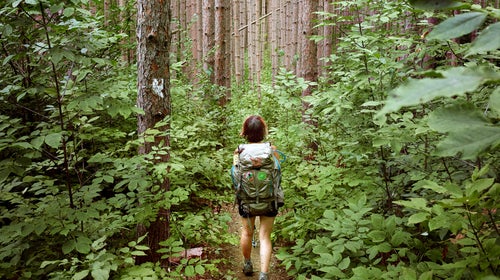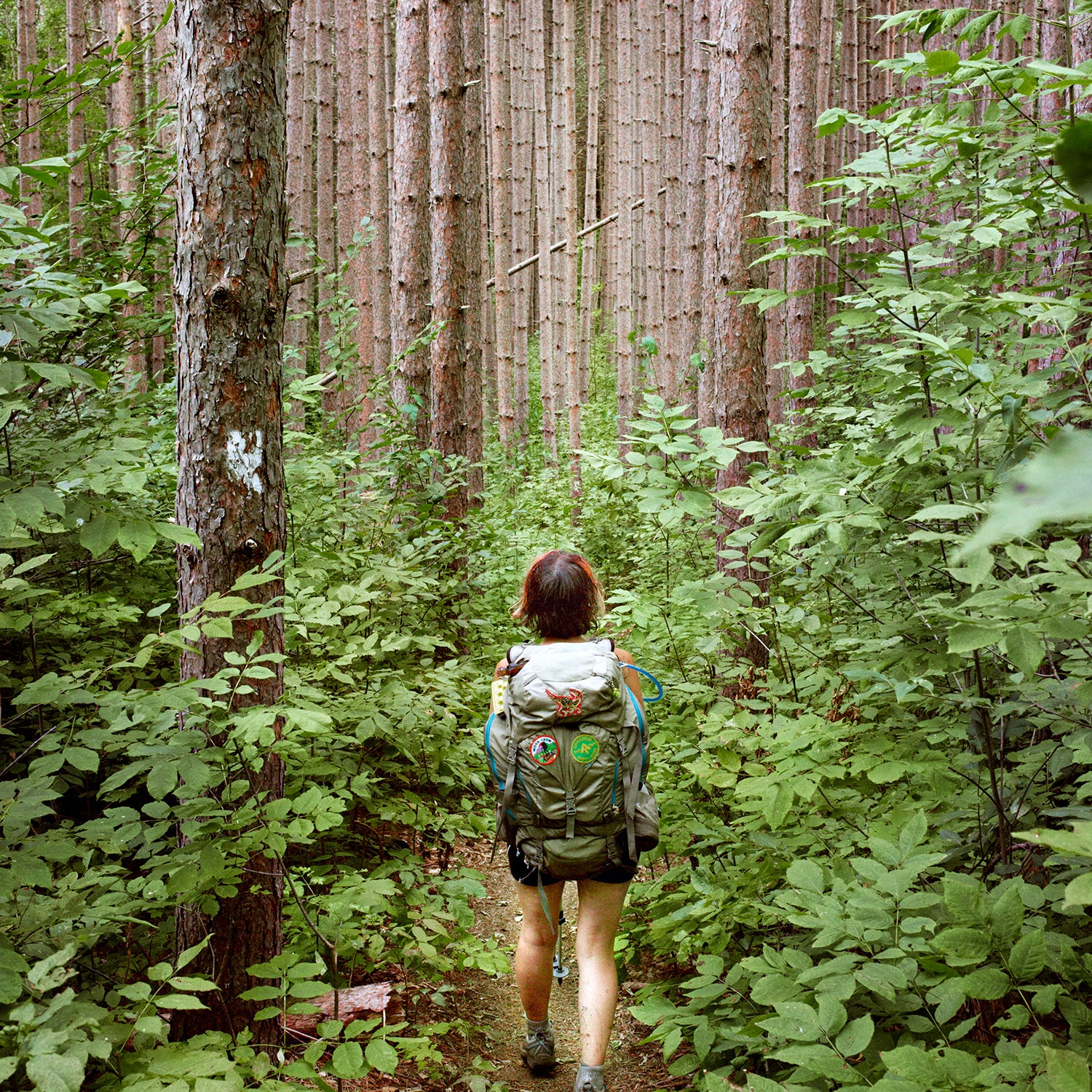Before my first thru-hike, I didn’t own a scale and never knew what I weighed. I enjoyed beer and bread, and running and hiking. People never made comments on my body, and beyond the everyday insecurities that commonly plague women, in my early twenties I never thought much about it.
At 25, I decided to hike the Appalachian Trail. As I researched, I became fascinated by the dramatic before-and-after pictures that fill on Instagram every late summer and fall. It seemed that no hiker could finish a trail without posting two photos side by side: a picture of themselves before their hike next to a photo of themselves thousands of miles later—tanner, more worn, and usually significantly skinnier. How strange must it be, I thought, to have your body change so much in just a few months. When I decided to try the AT myself, I wasn’t going out there to lose weight, but I was intrigued by the changes my body might undergo. I’d finish the trail in the best shape of my life, I figured, with the clearly defined muscles to prove it. I took a before photo in anticipation.
There was a saying I heard many times in my first few hundred miles on the AT: “At the end of a thru-hike, the men look like they’re starving and the women look like supermodels.” The fact that my first hiking partner on the trail was trying to lose weight probably exacerbated how many times people said it to us. We’d started from Springer Mountain, the southernmost point of the trail, at the same time, and he was open about his own goals for our upcoming trek. He was one of many people who set out to hike each year hoping to kick-start a healthier lifestyle. His frankness with everyone we met, from hostel owners to fellow thru-hikers, led to us hear the same adage time and again. We hiked the first 270 miles of trail together and sure enough, every time he could track down a scale, he seemed to weigh a little less.
While it wasn’t my goal, I was shedding weight too. Somewhere in Vermont, a little over 1,600 miles into my hike, I stepped on a scale and weighed 98 pounds, a full 30 pounds less than my average. I had spent most of New England battling muscle cramps and weakness and feeling cold all the time. I wondered if I had Lyme disease before I realized my symptoms were also consistent with an extreme calorie deficit. Meanwhile, my friends on Instagram told me how good my butt looked. I had the body you’d see on a magazine cover.
“At the end of a thru-hike, the men look like they’re starving and the women look like supermodels.”
My body was a wreck by the end of that first thru-hike. I had no energy on the trail, I ran out of food well before resupplies no matter how much I carried, and my muscles felt nonexistent. I worried many times that my body would give out before I had a chance to summit Mount Katahdin, the northernmost point of the AT. While climbing Mount Bigelow in Maine, I repeatedly threw up for no clear reason, losing precious calories. I had less than 200 miles to go, and it felt like my body was trying to reject this slog through any means possible. The dramatic physical change wasn’t fun or interesting, just stressful and detrimental to my main goal. I never took an after picture.
In our society, it’s widely considered impolite to comment on weight gain, but the same doesn’t hold true for weight loss. Something about my extreme shift and how I got there seemed to make people feel the door was open for comment. People told me I looked amazing, fit, powerful, and healthy. But I didn’t feel strong, and I knew my body would return to its normal self in a few weeks.
Other people told me that my beanpole frame wasn’t sexy at all: “Where did your butt go?” “Are you gaining the weight back?” “Do you want another cupcake?” they’d ask. Both approaches, while well intended, put the emphasis on what my body looked like instead of the amazing thing I had just done.
It’s been a relief to see more conversation in the last few years about the rudeness of remarking on any weight loss or gain, even positively. The constant commentary I received showed me that remarks of any kind bring with them years of ingrained biases and the inaccurate attitudes about that we’ve all been conditioned to have. The sudden and constant exposure to them gave me a body-image disturbance that has taken me several years to work through.
The dramatic physical change hadn’t been as fun or interesting as I’d thought it would be before setting out, just stressful and detrimental to my main goal.
I often thought back to the adage my hiking partner and I heard so often at the start of our hikes. My post-hike body did look more like a supermodel’s than it ever had. But it was clear to me that this wasn’t how my body should look at its healthiest. For my body, it was what starving looked like.
It’s not unusual for hikers to keep pack weight down by carrying less food than they need, and even hikers who are trying their best to fuel properly often run a calorie deficit. Even if I hadn’t run on so few calories on the AT, thru-hiking is hardly synonymous with a healthy lifestyle. Studies have shown the amount of physical exercise thru-hikers do does not make up for the fact that they are largely fueling themselves with stuff like Snickers, ramen, and Little Debbie snacks instead of a well-rounded diet rich in whole foods. The disconnect between the way we look and the health we are assumed to have became laughably apparent to me.
After several years and more thru-hikes, I’ve learned how damaging the fascination with pre- and post-hike bodies can be. I’d spend months thinking of my body as a tool at my disposal before abruptly returning to a world fixated on what it looked like.
But I’m getting better at ignoring these comments and letting myself just live in enjoyment of beer, bread, and hiking. I’ve started asking those closest to me to keep post-hike weight commentary to themselves. I aim for neutrality when I think about how my body looks, and instead focus on all the amazing things it’s allowed me to do. And you’ll never see a before-and-after shot on my Instagram.


